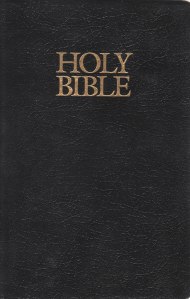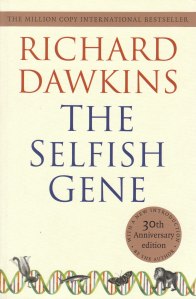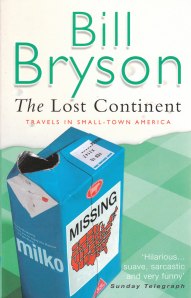 I’ve been reading the King James version of The Bible for a little while now. I chose the King James because I was Christianed as a protestant (Church of England), so I thought I may as well go with The Bible most relevant to me. Also, I don’t like how the simplified Bibles, such as the New International Edition, get rid of thou/thee and unto. It’s all about the ‘unto’; it makes The Bible so much more atmospheric.
I’ve been reading the King James version of The Bible for a little while now. I chose the King James because I was Christianed as a protestant (Church of England), so I thought I may as well go with The Bible most relevant to me. Also, I don’t like how the simplified Bibles, such as the New International Edition, get rid of thou/thee and unto. It’s all about the ‘unto’; it makes The Bible so much more atmospheric.
About a year ago, I made a blog called ‘Reading The Bible: An Atheist’s Experience’, and was going to post my thoughts and opinions on each book of the bible (For instance, I would have written 50 posts for the entirety of Genesis). But I found other blogs that were doing this and their conclusions just came across to me as crude, unintelligent and reductionist. So I decided against making the blog, closed it down and have continued reading The Bible without comment. At the moment I am up to Exodus 13. This isn’t really a review of The Bible – once I started reading it I realised that it is impossible to review something with so much content and history – I just want to discuss some of the things that have crossed my mind so far. I’ll probably do some more ‘random thoughts’ posts like this once I’ve read more.
The reason that I started reading The Bible is that I find ignorance inexcusable. This quote I think explains some of my anxieties about the lack of biblical knowledge amongst people my age:
‘Those who teach college students today see first hand the effect of these practices, … in the diminished store of their knowledge about the cultural traditions they are supposed to inherit. With the collapse of religion, biblical references, which formerly penetrated deep into everyday awareness, have become incomprehensible, and the same thing is now happening to the literature and mythology of antiquity – indeed, to the entire literature of the West, which has always drawn so heavily on biblical and classical sources. In the space of two or three generations, enormous stretches of the ‘Judeo-Christian tradition’, so invoked by educators but so seldom taught in any form, have passed into oblivion. The effective loss of cultural traditions on such a scale makes talk of a new Dark Age far from frivolous.” – Pg 150, The Culture of Narcissism, Christopher Lasch.
When I read this quote it really put into words something that I hadn’t been able to express. Modern curriculums are designed to be more inclusive – in English I learnt about all sorts of liberal concepts, such as ‘inner journeys’ and ‘aggression and the individual’ – but the courses were devoid of a solid foundation, which is the study of literature, in particular the classics (in my High School’s defence, they were pretty good with Shakespeare. We read ‘The Tempest’ and ‘Othello’, other classes did ‘Romeo and Juliet’). The result is that my generation has effectively been severed from its own culture in some ways, which is very tragic. I have many more thoughts on how the well-meaning, but idiotic curriculums designed by liberally minded intellectuals have negatively effected education, but that is for another post.
So part of the reason that I started reading The Bible was a way to experience first hand a text that has heavily shaped the actions, social order and philosophies of the people I descend from (I’m half Australian, half English – the Australian part being a Heins Variety mix of English, Scottish, Irish and German ancestry), and live with, regardless of whether we are conscious of its influence.
The first idea that struck me about The Bible is that in reality it is very, very different in tone, content and meaning than the way modern western Christians present it. I feel as if I have only received a sanitized version in the Hollywood movies and scripture classes (no surprises there). Hollywood movies I can forgive, but I don’t see why scripture did such a poor job.
The Bible is both mysterious and odd, and at times repetitive and boring. It reminds me of an old fairytale – and I don’t mean that as slander in the way that most atheists refer to biblical stories as ‘fairy tales’. I’m not referring to Disney’s white washed version of fairy tales, but to the ambiguous morals and darkness of the older fairy tales, which were often bloody, gruesome and confusing. They didn’t really make much sense to people beyond their times, so were often updated depending on the audience (I’ve read about ten different versions of Little Red Riding Hood which are all vastly different).
The patriarch’s (Noah, Abraham, Isaac and Jacob) in particular are pretty different from their spotless hero portrayal in the modern west. After fleeing his brothers wrath (because he stole his birthright), Jacob sets up a goat Ponzi scheme against his father in law (this subsequently causes him to flee his father in law also) (Genesis 30). Joseph condemns the Egyptians to slavery under the Pharaoh by selling them out during a famine (Genesis 47). Moses murders an Egyptian (who was beating a Hebrew slave) and promptly hides the body (Exodus 2: 11-12). These are the only examples I can remember immediately, but there are many more.
The patriarchs are also sometimes quite normal – not even the rewriting of history could save them from it. Moses response to Jehovah choosing him was ‘I’m pretty bad at public speaking; why don’t you choose someone else?’. Jehovah’s words were akin to ‘HOW DARE YOU?! I CREATED YOU, I MAKE THINGS GOOD…Fine, get your brother to do the proselytizing’ (Exodus 4:10-16).
The moral grayness of the patriarchs doesn’t bother me, mainly because I don’t consider them a call to virtue or morals. I am more of an onlooker to their triumphs and woes, and I find the paradox of their pettiness and greatness interesting. Apparently most Christians do not find this interesting, since they tend to de-emphasise these parts of the story or try to justify the patriarchs actions through some pretty stunning and hypocritical reasoning, which often involves a heavy dose of cognitive dissonance. If that fails, the ‘but the Old Testament doesn’t apply to Christians’ usually does the trick.
(Truthfully, I don’t want to sound so cynical, but this is the kind of reasoning I have come across on the internet and through the Christians I know. If any Christians or Jews would like to offer their account of how their Church teaches the Old Testament, including these morally odd parts, I would gladly like to hear).
I think its sad if Christians don’t ponder these conundrums, because this ‘warts and all’ approach in the early bible probably has the possibility of teaching us more about human nature than lessons learned from minimising the flaws or hero worshiping the patriarchs.
As for God himself, he could probably be described best as schizophrenic. At this stage he is pretty much living up to Dawkins’ description of him:
“The God of the Old Testament is arguably the most unpleasant character in all fiction: jealous and proud of it; a petty, unjust, unforgiving control-freak; a vindictive, bloodthirsty ethnic cleanser; a misogynistic, homophobic, racist, infanticidal, genocidal, filicidal, pestilential, megalomaniacal, sadomasochistic, capriciously malevolent bully” – The God Delusion, Richard Dawkins.
I’m not a fan of Dawkins, I can’t really argue with this summation. I would argue that although God is unpleasant this isn’t necessarily a bad thing (unless of course your belief is that he is supposed to be the moral centre of the universe….). He adds a very loud and sporadic presence to the narrative. However, I’m not that interested in God, rather how his creations interact with him. Gods that are meant to be all-powerful are really quite boring (the Olympians are my idea of entertaining), but Jehovah is not without his surprises.
One of the things that I’m enjoying the most about reading The Bible is being able to engage properly with the copious amount of literature and opinions around it. For instance, Slacktivist recently wrote a post about an interpretation of Joseph’s actions in Egypt and how the implications are widely ignored by modern Christians, which I can now more fully appreciate.
For instance, one of my favorite parts of The Bible so far is when God reveals himself to Moses through the burning bush (Exodus 9:1-14). Although the burning bush is fairly epic imagery, the reason I like this passage so much doesn’t really have to do with its events – rather some of the interpretations of its meaning. For instance:
“In E’s* account of the first meeting between Moses and the God who speaks to him from the burning bush, Yahweh reveals his name: ‘Ehyeh asher ehyeh’: ‘I am what I am’. Later Jews and Christians would interpret this to mean that God was being itself, He Who Is. But E did not yet think in these metaphysical terms. In his narrative, God may have been saying something far simpler. ‘Ehyeh asher ehyeh’ is a Hebrew idiom that expresses deliberate vagueness. The remark ‘they went where they went’, for example, means ‘I have no idea where they went’. So when Moses asked God who he was, Yahweh in effect replied: ‘Never mind who I am!'”- Pg 46, The Case For God, Karen Armstrong.
Every time I read this the scene in the bible it makes me laugh, because I imagine the momentary pause before God’s incredulous ‘Never mind who I am!’ reply. This is not to say that metaphysical interpretations of ‘I AM WHAT I AM!’ are wrong or unuseful, just that the original writers may not have had that in mind, and that this should be taken into consideration also.
But one of the best things is the way it is going to impact on my appreciation of art and literature. I’ve already become somewhat obsessed with find different versions of the depiction of Jacob wrestling the angel, because I love viewing each artist’s impression of the event. The way this will add another dimension to a great deal of my reading and viewing material is probably too big for me to grasp at the moment, but it feels awesome.
Based on what I’ve read so far, I would recommend reading The Bible to Christians and Atheists alike (and all the spectrums of belief and unbelief in between), but on the condition that you honestly try to digest it without the interpretations of either group playing too heavy an influence (I know this is near on impossible, but hear me out).
Christians, for instance, should try to really read what’s going on without apologetics goggles on (for instance in that Slacktivist topic on Joseph, one of the commenters wrote about how he had read the passage about Egyptian slavery many times without noticing its implications. His eyes had just glossed over it) and without running back to the Pope/Paster/Priest for glib interpretations of the grubby parts.
For atheists I would recommend reading the actual Bible, not the ‘Sceptics Annoted Bible’. I’m not saying never read this version, I’m sure it has many interesting factoids, just don’t do it the first time. It’s intellectually dishonest and the equivalent of Christians reading ‘The Origin of Species – Annoted by Creationists’, rather than Charles Darwin’s original. In case you haven’t noticed, sceptics tend to be sceptical and by association somewhat cynical about the Bible, which isn’t a wrong position – just a simplistic one at times.



You are so right. As for me in my church, the OT is taught just for the sake of merely knowing the Bible, and what I see is a lot of people who are memorizing facts with no clue of how to deal with it. They eventually end up discarding it. It’s kind of sad.
What denomination are you?
So, your church just goes ‘and then Abraham was like ‘do I really have to kill Isaac?” rather than actually talking about the implications of Jehovah’s early call to human sacrifice?
Non denominational. And yup, it pretty much goes omething like that.
That’s such a crying shame. How can they not talk about these things? Don’t they get bored?
In a weird way, I wish I had a chance to talk in churches (even though I’m an atheist), simply because I could probably dig out a whole lot of interesting stuff from the bible for them to think about on their sunday.
Interesting post. And I agree- us atheists need to actually READ the bible (and the history behind it) rather than just assume it’s all terrible and wrong. Such an education definitely sets us apart from those “pop atheists” that have messed up our public image.
On a side note- I actually found this blog when I was reading your exchange with Luke over at Common Sense Atheism. Didn’t think I’d find this.
Would you mind linking to the post on Common Sense Atheism? I’m just curious about what I said there, and I can’t find it by browsing my past comments in my wordpress dashboard or searching his site.
And I agree- us atheists need to actually READ the bible (and the history behind it) rather than just assume it’s all terrible and wrong.
I don’t really think any of it is necassarily right either…it’s just really juicy to read. I think it’s a really interesting tome about human nature and from that point of view you can’t miss it. But it is SO FUCKING BORING in some parts as well, so keep that in mind.
I just think that if you’re going to make comment on it, you have to know what you are talking about. For instance, Jen McCreight at Blag Hag did a post about how she is never going to read the bible, which I found incredibly ignorant – considering she runs an atheist blog (apart from that she usually writes wonderfully). It’s like someone saying they don’t believe in evolution when they don’t know anything about the science.
Look into Joseph Prince and Andrew Wommacks teachings. Joseph Prince expounds on old testament stories in the light of new testament doctrine. Wommack does an excellent job at explaining doctrine and the idea of God being “schizophrenic”.
Glory be to god for a such a web site for bible
This is the best app ever
Reading through the bible is a daily rountin to me.
it is a good thing to do.
It right
It so good
Pingback: What People Search on Google : domonetize.com
I think it is okay
K